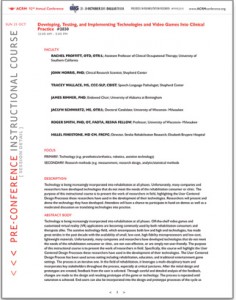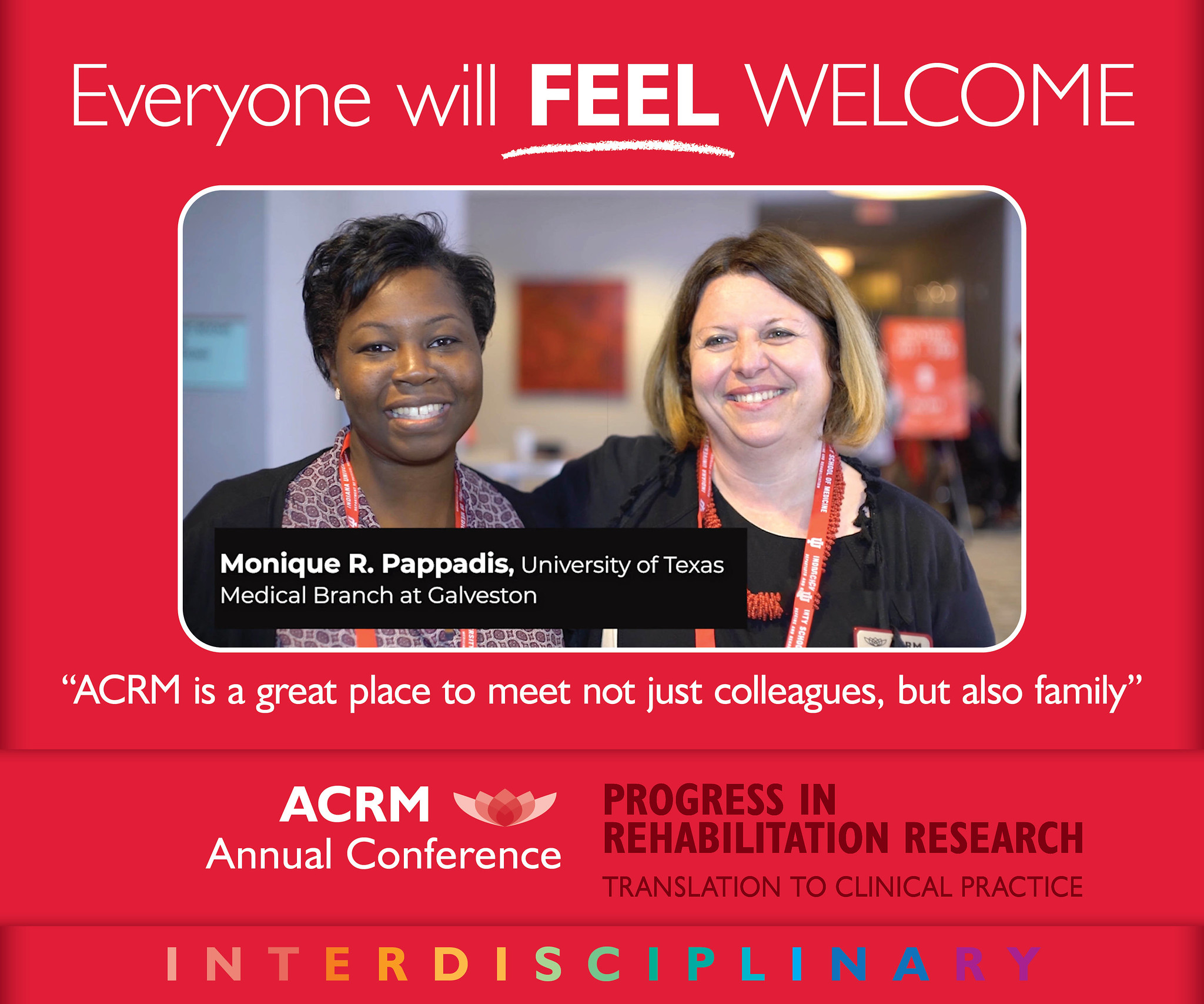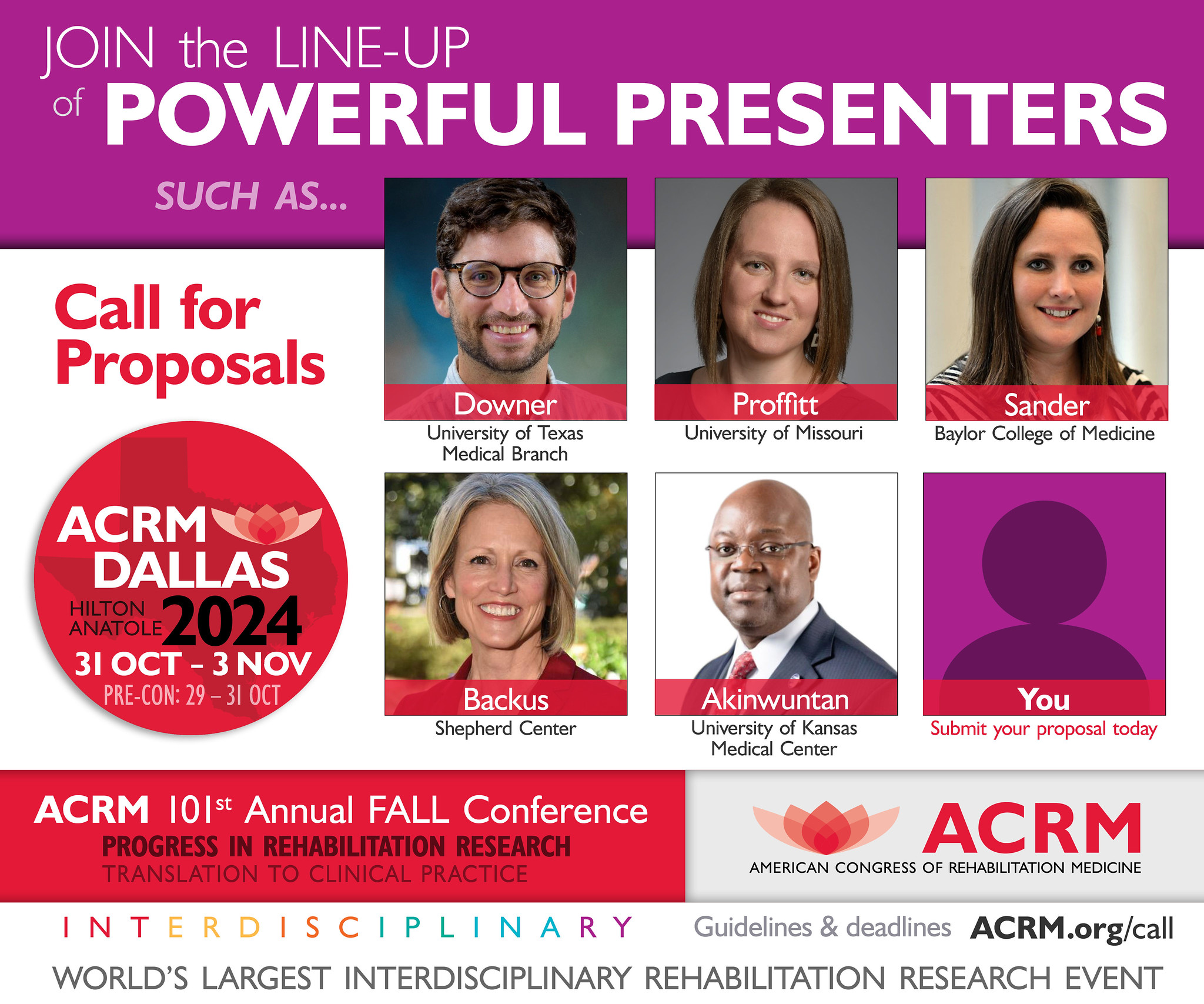INSTRUCTIONAL COURSE DETAIL
SUN, 25 OCT: 13:00 PM – 17:00 PM
SPEAKERS
Rachel Proffitt, OTD, OTR/L; Assistant Professor of Clinical Occupational Therapy; University of Southern California
John Morris, PhD; Clinical Research Scientist; Shepherd Center
Tracey Wallace, MS, CCC-SLP, CBIST; Speech-Language Pathologist; Shepherd Center
James Rimmer, PhD; Endowed Chair; University of Alabama at Birmingham
Jaclyn Schwartz, MS, OTR/L; Doctoral Candidate; University of Wisconsin- Milwaukee
Roger Smith, PhD, OT, FAOTA, RESNA Fellow; Professor; University of Wisconsin- Milwaukee
Hillel Finestone, MD CM, FRCPC; Director, Stroke Rehabilitation Research; Elisabeth Bruyere Hospital
DIAGNOSIS
Diagnosis-independent or NA
FOCUS
PRIMARY: Technology (e.g. prosthetics/orthotics, robotics, assistive technology)
SECONDARY: Research methods (e.g. measurement, research design, analytic/statistical methods
DESCRIPTION
Technology is being increasingly incorporated into rehabilitation at all phases. Unfortunately, many companies and researchers have developed technologies that do not meet the needs of the rehabilitation consumer or clinic. The purpose of this instructional course is to present the work of researchers in field, highlighting the User Centered Design Processes these researchers have used in the development of their technologies. Researchers will present and demo the technology they have developed. Attendees will have a chance to participate in hand-on demos as well as a moderated discussion on translating technologies into practice.
ABSTRACT BODY
Technology is being increasingly incorporated into rehabilitation at all phases. Off-the-shelf video games and customized virtual reality (VR) applications are becoming commonly used by both rehabilitation consumers and therapists alike. The assistive technology field, which encompasses both low- and high-end technologies, has made great strides in the past decade with the availability of small, low-cost, high-fidelity microprocessors and low-cost, lightweight materials. Unfortunately, many companies and researchers have developed technologies that do not meet the needs of the rehabilitation consumer or clinic, are not cost-effective, or are simply not user-friendly.
The purpose of this instructional course is to present the work of researchers in field. Specifically, this course will highlight the User Centered Design Processes these researchers have used in the development of their technologies. The User Centered Design Process has been used across setting including rehabilitation, education, and traditional entertainment game settings. The process is an iterative one. In the field of rehabilitation, it leverages a multi-disciplinary team and incorporates key stakeholders throughout the process, especially at critical junctures. After the initial design and prototypes are created, feedback from the user is solicited. Through careful and detailed analysis of the feedback,
changes are made to the design and resulting prototype of the game or technology. The process is repeated until saturation is achieved. End-users can also be incorporated into the design and prototype processes of the cycle as active members of the research team.
For this instructional course, five research teams will present on an application, technology, or game they have developed. The presentations will focus on the development process, including the User Centered Design Process, and address key barriers and facilitators to the process. Each presentation will last 20 minutes with 5 minutes for questions. Following the five presentations, attendees will move round-robin format to view a demo of the developed technology by each presenter. This hands-on format of the demo session will allow attendees to ask in-depth questions, assess the technology from their professional standpoint, and allow for interaction between professionals.
The demo session will last for 60 minutes. A short 10 minute break for coffee after the presentations and before the demo session will allow for presenters to make final adjustments to their demonstration set-up and allow attendees a necessary break. Following the demo session, the course organizer will provide a brief presentation (10-15 minutes) on FDA approval, issues with translation to practice, commercialization, and large scale clinical trial structures. The six presenters (five research teams) will be invited to have an engaging discussion with the course attendees in panel format. The panel and audience discussion will be moderated.
LEARNING OBJECTIVES
- Identify three barriers to implementation of the described technologies in clinical practice and three potential solutions to overcome the barriers
- Describe the User Centered Design Cycle and identify the areas in which patients and clinicians can have input
- Discuss 2 clinical applications of a piece of technology that is currently in development
BIO SKETCHES
Rachel Proffitt is an Assistant Professor of Clinical Occupational Therapy in the USC Division of Occupational Science and Occupational Therapy and leads the Game Based Rehabilitation Lab at the USC Institute for Creative Technologies. The interdisciplinary team she leads is focused on developing customized, game-based, virtual reality technologies for rehabilitation. Dr. Proffitt’s primary focus in both her research and clinical practice is neurological rehabilitation. She is conducting pilot clinical trials with traumatic brain injury, stroke, amputee and healthy aging populations using the developed games and systems. Dr. Proffitt recently completed a T32 Postdoctoral Fellowship with training emphasis on conducting rehabilitation efficacy and effectiveness trials and was subsequently awarded a K12 career development award to provide protected research time for her research activities and further investigation of her primary research interests. Dr. Proffitt also teaches the Assistive Technology class within the occupational therapy master’s program and provides patient care at Keck Medical Center of USC. She earned her Doctorate of Occupational Therapy degree from Washington University School of Medicine in St. Louis.
John Morris, PhD is a Clinical Research Scientist for the Rehabilitation Engineering Research Center for Wireless Technologies (Wireless RERC) and the Shepherd Center in Atlanta, Georgia. The Wireless RERC is funded by the U.S. Department of Education’s National Institute on Disability and Rehabilitation Research (NIDRR). John received his MA and PhD in Government from the University of Texas at Austin. John is director of the Wireless RERC’s consumer research projects, as well as director of Shepherd Center’s Interactive Technology Usability Lab. His research focuses on consumer insights, design and usability, and accessibility of technology for people with all types of physical, sensory and cognitive limitations. Previously, John served as a visiting assistant professor at the University of Connecticut and Brown University. He also worked for the Oracle Corporation as a senior product development manager.
Tracey Wallace is a Speech-Language Pathologist and Clinical Research Scientist at Shepherd Center, in Atlanta, Georgia where she provides speech therapy to patients in the hospital’s inpatient and outpatient acquired brain injury rehabilitation programs. She also performs clinical research, provides mentorship to staff and participates in community outreach and advocacy. Tracey has over 15 years of experience using assistive technology for cognition to help people with cognitive-communication impairments function more independently and participate in desired activities at home, work, school and in their community. She is a Certified Brain Injury Specialist Trainer and has published and lectured nationally on outcomes, functional interventions and the use of technology in rehabilitation for brain injury.
Dr. James Rimmer is director of the Lakeshore Foundation/University of Alabama-Birmingham Research Collaborative. Until 2012, he was professor of disability and human development at the University of Illinois at Chicago. For the past 25 years, Dr. Rimmer has been developing and directing health promotion programs for people with disabilities. He has published more than 100 peer-reviewed journal articles and book chapters on various topics related to physical activity, health promotion, secondary conditions and disability. He is director of two federally funded centers, the National Center on Physical Activity and Disability and the Rehabilitation Engineering Research Center on Interactive Technologies and Exercise Physiology for People with Disabilities. Since 1997, Dr. Rimmer has been awarded over $25 million in federal funding.
Jaclyn Schwartz is an occupational therapist and PhD Candidate at the University of Wisconsin-Milwaukee who focuses on supporting people with chronic health conditions in the community. She has served as the content team lead on six app development projects related to environmental accessibility for persons with disabilities. Further, Ms. Schwartz has authored 24 presentations and 7 proceedings on this topic.
Dr. Smith’s research focuses on measurement related to disability and the application of assistive technology & universal design. In measurement, Dr. Smith examines assessments to determine their reliability and validity in use. He has created a software based evaluation system that uses a branching question structure called TTSS (Trichotomous Tailored Subbranching Scoring). One component of Dr. Smith’s current research specifically investigates the utility of the TTSS methodology as embedded in OTFACT software. Dr. Smith also investigates the effectiveness of assistive technology and universal design interventions on the lives of people with disabilities. Currently, Dr. Smith directs several federally funded projects. Dr. Smith has served as primary author and director for more than 30 grant and contract awards of over 8 million dollars of extramural sponsored research and training programs. These projects have supported many dozens of students in assistive technology training and in research support positions.
Dr. Hillel Finestone is a specialist in Physical Medicine and Rehabilitation, or physiatrist. He graduated from McGill Medical School and received Physical Medicine and Rehabilitation specialty training at the University of Ottawa and the University of Michigan. He is an Associate Professor in the Division of Physical Medicine and Rehabilitation at the University of Ottawa. Dr. Finestone is the Director of Stroke Rehabilitation Research at Élisabeth Bruyère Hospital, Bruyère Continuing Care and an electromyographer at the Ottawa Hospital Rehabilitation Centre. Dr. Finestone’s stroke research interests include 1) nutritional issues, 2) driving, 3) use of virtual reality training and 4) rehabilitation. He recently wrote a book, for health care professionals and laypersons, entitled “The Pain Detective, Every Ache Tells a Story” (published by Praeger ABC-Clio, 2009, Santa Barbara, CA). The book describes, in a clinical case format, the roles that psychological and social factors may play in healing and recovery from a painful musculoskeletal injury.
One full day of Instructional Courses $195 Three full days $395
WORLD PASS (from $595) is the best value if you attend just one instructional course and the CORE Conference. Pricing detail CLICK HERE![]()
*Although significant changes are not anticipated, all schedules, sessions, and presenters posted on this website are subject to change.










